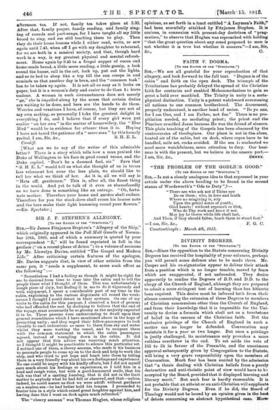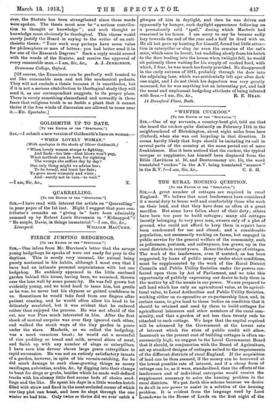DIVINITY DEGREES.
[To THE EDITOR CY THE -srscrsToe.••] Sia,—Since the opposition to the Statute concerning Divinity Degrees has received the hospitality of your columns, perhap'S you will permit some defence also to be made there. Mr. Cooper and his co-signatories appear to deliver their attack from a position which is no longer tenable, moved by fears which are exaggerated, if not unfounded. They desire apparently to confine the Degrees of B.D. and DI). to the clergy of the Church of England, although they are prepared to admit a more stringent test of learning than has hithertO been required. This desire must be inferred both from their silence concerning the extension of these Degrees to members of Christian communions other than the Church of England, and from their knowledge that it is impossible for the Uni- versity to devise a formula which shall act as a touchstone of belief in the essence of the Christian faith. But the exclusive privilege of the Church of England in such a matter can no longer be defended. Convocation may maintain it for a year or two longer. But once a privilege is justly challenged, its maintenance only provokes a more ruthless overthrow in the end. To set aside the vote of 185 to 3t in favour of the Preamble, and the unanimous approval subsequently given by Congregation to the Statute, will bring a very grave responsibility upon the members of Convocation. Much fear has been excited by the admission that "a thesis dealing with Christian beliefs from a purely destructive and anti-theistic point of view would have to b.3 accepted by the Board, provided that it displayed learning and literary merit." Hut such fear is hardly reasonable. It is net probable that an atheist or an anti-Christian will supplicate for the Divinity Degrees. Even if he did, the Board of Theology would nob be bound by an opinion given in the heat of debate concerning an abstract hypothetical case. More. over, the Statute has been stretigthened since these words iverespoken. The thesis must now be "a serious- contribu- tion to thought or knowledge " ; and such thought or knowledge must obviously be theological. This clause would surely justify the Board in saying to the writer of an anti- theistic thesis.: "Your work may perhaps have some value for philosophers or men of letters : you had better send it in for one of the Research Degrees." Such a reply would accord with the words of the Statute, and receive the approval of every reasonable man.—I am, Sir, &c., A. J. JENKINSON.
Brasenose College, Oxford.
[Of course, the Examiners can be perfectly well trusted to act like reasonable men and not like mechanical pedants. They will not exclude a thesis because it is unorthodox, but if it is not a serious contribution to theological study they will send it, as our correspondent suggests, to its proper place. There is surely something shamefaced and cowardly in these fears that religious truth is so feeble a plant that it cannot thrive if the free winds of discussion are allowed to come near it.—En. Spectator.]















































 Previous page
Previous page